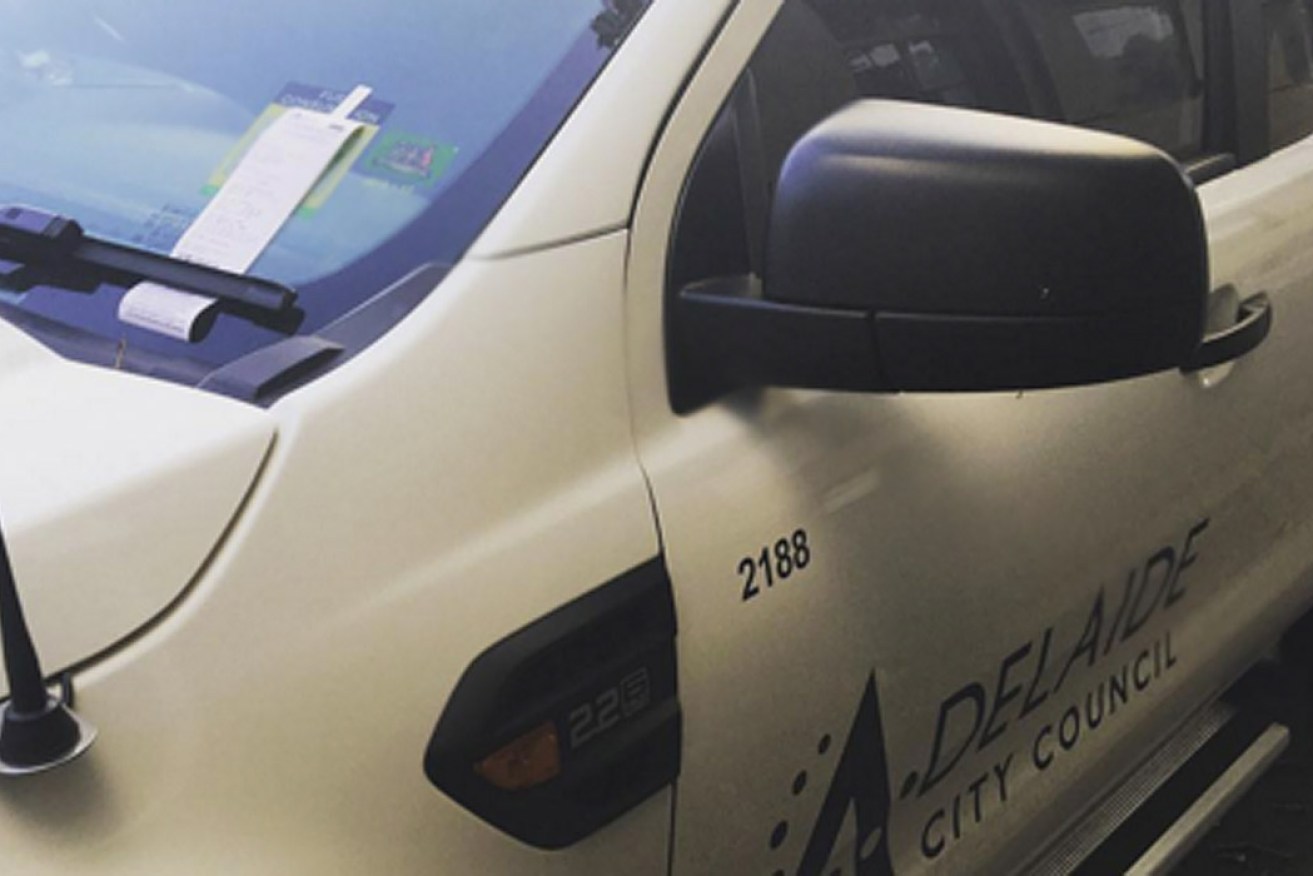Fines to decline: what next for Adelaide’s parking inspectors?
The Adelaide City Council says it will steeply reduce parking fines in coming years using smart parking technology – but insists it has “no intention” of sacking its parking inspectors.


The rules are for everyone: A city council vehicle caught by council parking inspectors in an image circulating on social media this week. Photo: Claude Creighton.
By 2017, the council “will develop a fully costed plan to implement smart parking technology across the city and North Adelaide to create an expiation free environment,” its draft 2016-2020 strategic plan says.
Smart parking technology works using overhead or underground sensors in car parks that connect to a motorist’s smart phone.
Reminder messages can be sent to the smart phone when the parking space is nearly expired, and users would be able to “top up” their pre-paid parking, at a premium, from their phone.
While Lord Mayor Martin Haese concedes a totally “expiation-free environment” is impossible – some people will always park illegally – he hopes the on-street sensor technology will significantly reduce the number of parking fines.
He said the technology would let motorists “take back control” of what they pay for parking, and prevent unnecessary fines when they want to remain in the park beyond their pre-paid time limit.
“If we were issuing a considerably lesser number of expiations, our CEO [Mark Goldstone] would need to review the role and function of those that issue expiations,” he told InDaily today.
Goldstone said in a statement that “there is no intention for the use of smart technology to impact upon employee numbers”, but also said smart parking “may allow us to divert resources to other frontline services to benefit ratepayers and visitors to the city”.
“We believe there will be still an important role for Parking and Information Officers in a smart parking city albeit it won’t be as focused on expiations,” he said.
Councillor David Slama told InDaily the smart parking program would be a good way to transition the council’s 40 parking inspectors to a “customer experience” and tourism role.
“That’s where I see these people ending up,” he said.
However, “the re-skilling won’t be for everyone” and “I can’t see 100 per cent all of them staying on”.
Slama said he had had bad experiences with city parking inspectors who “see their job as a police officer type” and “I’ve certainly met quite a few and I can’t see them being customer service [employees]”.
Joseph Scales of the Australian Services Union, which represents the parking inspectors, told InDaily there had not yet been any consultation from the council about any job cuts resulting from the smart parking technology.
“It hasn’t been made clear to us the impact on the workforce,” said Scales.
“What’s happened elsewhere [with smart parking technology installed is] there’s some efficiency gains.”
But because the technology was unable to issue expiations to illegal parkers, he said, “there’s still a roll for the parking inspectors”.
According leading digital parking company Smart Parking Limited, the “main aim” of smart parking technology is to “encourage and promote a culture of compliance rather than one of enforcement”.
“Parking inspectors’ focus [becomes] assisting drivers, providing information and directions, interacting with businesses and managing the kerbside and access to it, while retaining the power to enforce if and when necessary,” the company’s promotional material says.
The Adelaide City Council earned between $12 million and $15 million each year over the past five years from expiations. That’s a significant chunk of the council’s revenue, which totalled about $190 million in 2015-16.
The council’s IT staff have yet to determine the cost of installing car park sensors in the city’s 18,400 on-street car parks.
Haese said the technology would first be rolled out to on-street car parks before being integrated in the council’s off-street commercial car parks.
The timing and locations of the rollout are yet to be determined.
The council’s associate director of information management, Peter Auhl, told InDaily “we’re not seeing this as incredibly expensive”.
The council’s IT and transport experts are investigating various business models for the smart parking rollout, and will take lessons from a trial now underway in Canberra.
“We haven’t worked through all the types of business models that we would adapt,” said Auhl.
“We’re looking for a really integrated experience for on-street and off-street parking.”
He said council staff were also working through how city users without smart phones would use the system.




